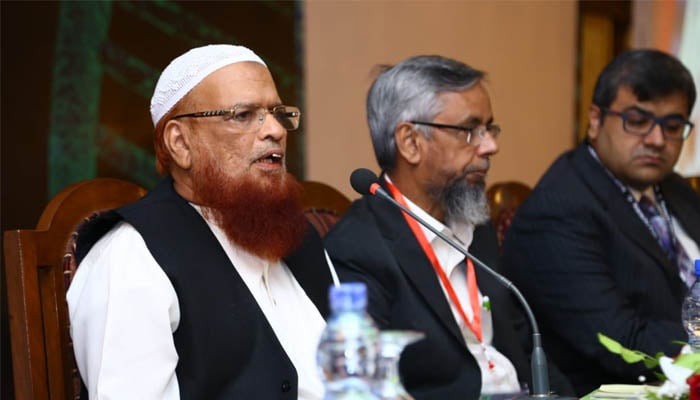Don’t take extraordinary measures for patient where cure is unlikely: Mufti Taqi Usmani
Eminent Islamic scholar Mufti Taqi Usmani has said that patients should not be placed on ventilators for unlimited time if there is no hope of their recovery and attendants should follow the advice of doctors about their patients’ health and well-being.
Karachi: Eminent Islamic scholar Mufti Taqi Usmani has said that patients should not be placed on ventilators for unlimited time if there is no hope of their recovery and attendants should follow the advice of doctors about their patients’ health and well-being.
“Extraordinary measures should not be taken for the treatment of a patient where it is known that it would definitely enhance the sufferings of a patient but cure is least likely”, Mufti Taqi Usmani said while speaking on “End of Life and Palliative Care: An Islamic Perspective”, at concluding day of Karachi Con’18 of Pakistan Islamic Medical Association (PIMA) here at a local hotel on Sunday.
Two-day Karachi Con’18 was city's biggest gathering of medical professionals, practitioners, researchers and medical students which was attended by over 2000 participants from public and private health facilities, medical Universities of the country, research institutions and various emerging issues and challenges facing the medical fraternity came under discussion at the conference.
On the occasion, 11 leading NGOs and institutions which are serving the suffering humanity in the country including Health and Nutrition Development Society (HANDS), National Institute of Blood Diseases (NIBD), SINA Health and Education Services, Patient Aid Foundation, Indus Hospital Transfusion Services, Baqai Institute of Diabetology and Endocrinology (BIDE), Bait-ul-Sakoon Cancer Hospital, Omair Sana Foundation, Dua Foundation, Prevention of Blindness (POB) Eye Hospital Karachi and Alkhidmat Foundation were acknowledged Excellence in Healthcare Awards.
Speaking on the occasion, Mufti Taqi Usmani said medical profession can become a mode of worship of Almighty Allah if a doctor aims for alleviating the sufferings of the sick.
He clarified that while getting treatment of any disease is not a mandatory obligation (farz) in Islam, rather it is a sunnah of Prophet Muhammad (Peace Be Upon Him) to get treatment, on the other hand patients should not put themselves in pain and choose difficult treatments where chances of recovery and cure are minimal.
Mufti Taqi Usmani also urged PIMA to educate doctors against use of illegal and immoral practices of prescribing unnecessary medicines and investigations for monetary benefits.
The renowned Islamic scholar further said Pakistan was rich in herbs and plants which had extraordinary medicinal properties and called for conducting research on these herbs and plants so that people could have cost effective treatment of so far incurable diseases and other conditions.
To a query, he said apart from life-threatening conditions, haram substances like opioids could be prescribed by doctors to relieve pain of critically ill patients and added that Islam allows use careful use of addictive substances for the relief of suffering, which are otherwise not allowed for healthy people.
Dr. Atif Waqar, palliative care expert from Aga Khan University Hospital said controlling pain in patients with cancer not only help in minimizing their sufferings but it also provides them chance to be close to their Creator in the last days of their lives.
He maintained that while morphine, an extraordinary drug, which relieves pain of terminally-ill patients and helps difficulty in breathing in terminal cases, it should only be prescribed by the experts with knowledge and command over its usage.
Chairman of the Karachi Con’18 Dr. Shamvil Ashraf also raised several issues regarding pain management and palliative care, use of limited resources on the treatment on incurable patients and use of drugs to minimize the sufferings of the patients while Pro. Junaid Patel, Prof. Hafeez ur-Rehman and Dr. Ahmer Hamid also spoke.
Giving a plenary talk on 'Patient centric care', eminent physician Dr. Zakiuddin Ahmed called for involving patients in decision making, saying October 2018 is the Patient-Centered Care Awareness Month, which demands physicians to give priority to wellbeing of their patients instead of disease or any other aspect of medical profession.
He shared statistics of US about medical errors being the third largest cause of deaths, misuse of antibiotics in up to 50 percent cases prescribed and deteriorating quality of healthcare despite trillions of dollars in spending and urged Pakistani physicians to give priority to their patients and their families.
Various other leading experts and physicians including Prof. Sohail Akhtar, Dr. Atif Hafeez, Prof. Hafeez ur Rehman, Dr, Zeeshan Ansari, Dr. Azeemuddin, Dr. Kashif Shazlee, and others also spoke in different scientific sessions at the conference.
-
Security forces gun down 30 terrorists in multiple IBOs in KP: ISPR
-
MQM-P calls for new province in Sindh
-
US report validates Pakistan military edge over India: PM
-
Banned TTP poses serious threat to Pakistan security: UNSC panel
-
CM Afridi clarifies remarks on by-poll after ECP requests army deployment
-
Dubai sees 3.2m Pakistani passengers in 2025 as airport sets new milestone
-
Security forces kill 23 Indian proxy terrorists in KP's Kurram
-
Pakistan to construct island to boost oil exploration: report












